Just In
- 2 hrs ago

- 3 hrs ago

- 7 hrs ago

- 8 hrs ago

Don't Miss
- Movies
 Nargis Fakhri Is True Water Baby & These HOT Pics Are Proof! Clamming, Jet Skiing Are Her FAV
Nargis Fakhri Is True Water Baby & These HOT Pics Are Proof! Clamming, Jet Skiing Are Her FAV - Sports
 On This Day in IPL: CSK Played their First Match at Chepauk, Dhoni scored first 20th Over Six
On This Day in IPL: CSK Played their First Match at Chepauk, Dhoni scored first 20th Over Six - Finance
 Rs 2.20/Share Dividend Declared: 84-Yrs Old Small Cap Tata Co Reports 7.7% Rise In Net
Rs 2.20/Share Dividend Declared: 84-Yrs Old Small Cap Tata Co Reports 7.7% Rise In Net - News
 Goa's Railway Renaissance: BJP's Vision Transforms Connectivity
Goa's Railway Renaissance: BJP's Vision Transforms Connectivity - Education
 Meet Naima Khatoon, First Vice Chancellor of AMU, Know Her Background and Education Qualification
Meet Naima Khatoon, First Vice Chancellor of AMU, Know Her Background and Education Qualification - Technology
 Xiaomi Robot Vacuum Cleaner S10, Handheld Garment Steamer, and Redmi Buds 5A Launched in India
Xiaomi Robot Vacuum Cleaner S10, Handheld Garment Steamer, and Redmi Buds 5A Launched in India - Automobiles
 Nissan Magnite Achieves 1 Lakh Unit Sales Milestone: Consistency Helps
Nissan Magnite Achieves 1 Lakh Unit Sales Milestone: Consistency Helps - Travel
Kurnool's Hidden Gems: A Guide To Exploring India's Lesser-Known Treasures
Exercising During Pregnancy: Benefits, Exercises To Do, Avoid And Tips To Follow
When you are pregnant you are likely to feel more tired than usual and want to relax. It is normal to feel that way, however, unless you are experiencing complications, relaxing for long and not being physically active could increase certain health risks like deep venous thrombosis and obesity during pregnancy [1]. Obesity elevates the risk of major complications like spontaneous abortions, neural tube defects, gestational diabetes, sleep apnea, preeclampsia, preterm birth and stillbirth [2].
Exercise improves physical and mental health during pregnancy, and despite this, studies show that only about 40 per cent of pregnant women exercise [2]. Exercising during pregnancy has been shown to reduce the risk of low back pain, gestational diabetes, preeclampsia, cesarean delivery, pelvic girdle pain, macrosomia and urinary incontinence [2].
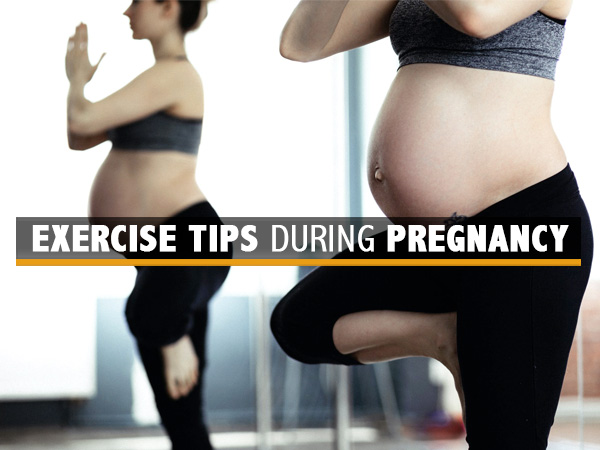
Why Pregnant Women Should Exercise?
Regular moderate-intensity exercise during pregnancy has a number of benefits, these include: [3] [4] [5] [6]
- Preventing excess weight gain.
- Helping in better sleep.
- Boosting mood and energy levels.
- Reducing back pain, constipation, bloating and swelling.
- Promoting strength and endurance.
- Lowering gestational diabetes risk.
- Preparing the body for labour and delivery.
- Increasing heart rate and improving blood circulation.
- Reducing the risk of preterm or caesarean delivery.
- Shortening labour and decreasing the need for pain-relieving medications.
- Speeding up recovery after delivery.
A research study also suggests that regular physical activity during pregnancy benefits the foetus; it decreases fat mass, improves stress tolerance and enhances nervous system development [7].
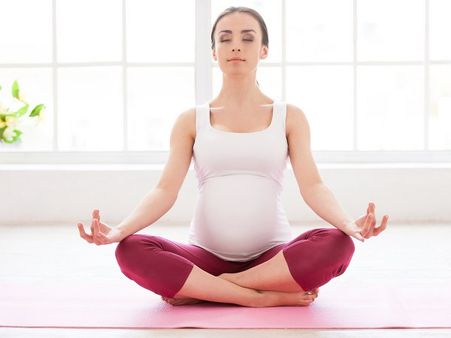
What Exercises Are Safe During Pregnancy?
Aerobic exercises, also called cardiovascular exercise, are safe and considered the most beneficial exercises during pregnancy, these include the following: [8].
- Walking
- Cycling
- Swimming [9]
- Aerobic dance
- Yoga
- Stair steppers
- Ellipticals
Studies suggest that pregnant women should perform a moderate-intensity exercise for 20-30 minutes daily for five days each week. Women who were exercising before pregnancy can continue as before during pregnancy while making changes in their exercise programme as the pregnancy progresses. And women who were not active before pregnancy can exercise for five minutes per day and then gradually increase 5-10 minutes and perform exercise each week [10] [11].

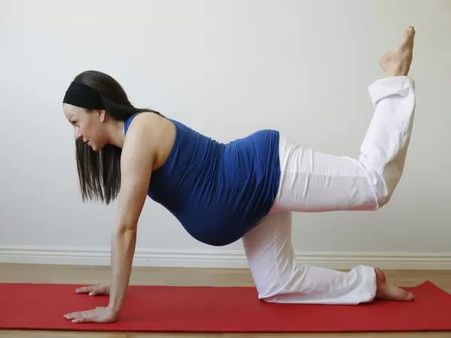
Exercises To Avoid During Pregnancy
- Avoid any exercise that let you to lie flat on your back, particularly after 16 weeks of pregnancy.
- Do not take part in contact sports such as squash, tennis, judo, basketball, football and kickboxing.
- Avoid doing horse riding and gymnastics.
- Avoid taking part in scuba diving, skiing and skydiving [12].
- Avoid doing any exercise that lets you hold your breath.
- Avoid jumping, skipping or running exercises.
- Avoid deep knee bends, full sit-ups, double leg raises and straight-leg toe touches exercises.
- Exercises that require you to lie on your back or right side for more than three minutes should be avoided, especially after your third month of pregnancy.
- Avoid doing waist-twisting while standing exercise.


Who Should Not Exercise During Pregnancy?
Before beginning any exercise programme, pregnant women should consult with their doctor. Your doctor will provide you personal exercise guidelines based on your medical history. Your doctor might advise you not to exercise if you have the following problems: [10]
- Some forms of heart and lung disease
- Preeclampsia
- Severe anaemia
- Weakened cervix
- Placenta problems
- Persistent vaginal bleeding during the second or third trimester
- Preterm premature rupture of membranes
- Preterm labour

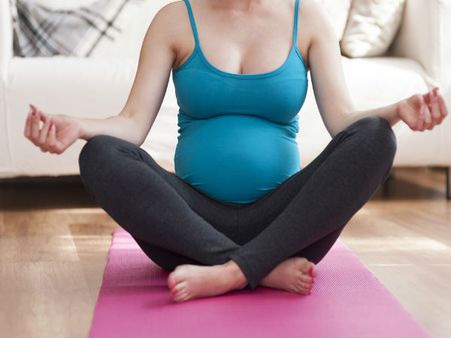
Exercise Tips To Follow During Pregnancy
Before starting to exercise, it is recommended to warm up and stretch your body for five minutes and end your exercise session with gentle stretching. Here are some exercise tips to follow during pregnancy:
- Wear loose-fitting, comfortable clothes and a well-fitting bra.
- Choose supportive shoes specific to the type of exercise you are doing to help prevent injury.
- Exercise on a flat surface to prevent injury.
- Avoid overheating your body when exercising.
- Eat your meal at least one hour before exercising.
- Drink water before, during and after your workout to keep your body hydrated.
- After doing certain floor exercises, get up slowly and gradually to prevent dizziness.
- Do not exhaust yourself when exercising.
- Try to be physically active as much as possible, even five minutes of walking exercise is enough.
- Avoid doing strenuous exercise in hot and humid weather.
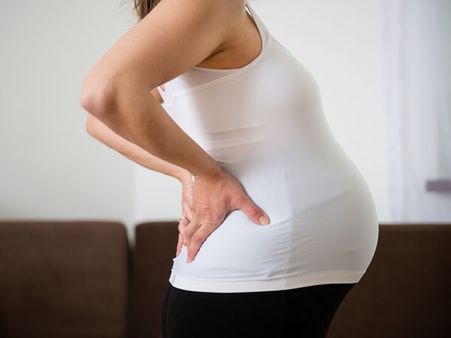
When To Stop Exercising During Pregnancy?
You need to stop exercising and seek medical attention immediately if you experience the following problems:
- Chest pain
- Muscle weakness
- Unexplained shortness of breath
- Headache and dizziness
- Calf pain, swelling or redness
- Nausea and vomiting
- Vaginal bleeding
- Sudden swelling of the ankles, hand or face
- A reduction in your baby's movement
- Weakness or fatigue
- A rapid or irregular heartbeat
- Leakage of amniotic fluid
- Have difficulty in walking
- Have persistent uterine contractions that continue even after rest
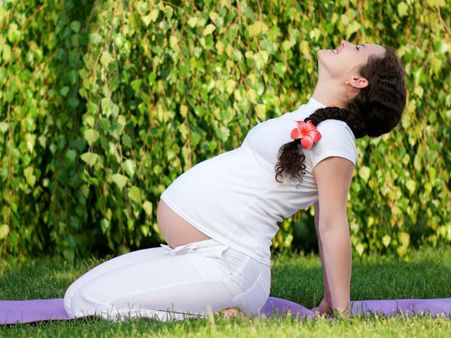
What Pregnancy Changes May Affect Your Exercise?
Physical changes that occur during pregnancy create more demands on your body. Keep in mind that you need to listen to your body and adjust your exercise routine accordingly.
- Your developing foetus and other internal organs require oxygen. When you exercise and your muscles work harder, your body uses more oxygen. To cope with this extra demand of the body, your breathing increases. So, take rest between your exercises and avoid overexertion.
- Hormones such as relaxin are produced during pregnancy, which loosens the ligaments and this could increase your risk of joint injuries.
- As pregnancy progresses, your weight will increase and you will experience changes in body shape and weight distribution. This extra weight also puts pressure on the joints and muscles in your lower back and pelvic area, which can alter your balance and coordination during exercise.
- Your blood pressure drops during the second trimester of pregnancy so avoid changing exercise positions rapidly to prevent dizziness.
To Conclude...
Exercising regularly can boost the health of both the pregnant woman and her baby and it can also make pregnancy, labour and post-delivery recovery easier. However, it's important to exercise safely during pregnancy to prevent any injuries. Also, pregnant women should consult with their doctor before starting any exercise programme.
-
 healthSolar Eclipse 2024: Dos and Don'ts for Pregnant Women During Surya Grahan
healthSolar Eclipse 2024: Dos and Don'ts for Pregnant Women During Surya Grahan -
 healthLunar Eclipse 2024: Dos And Don'ts For Pregnant Woman During Chandra Grahan
healthLunar Eclipse 2024: Dos And Don'ts For Pregnant Woman During Chandra Grahan -
 fashionDeepika Padukone-Ranveer Singh Announce Pregnancy: 6 Maternity Outfit Ideas For The Modern Mom-to-Be
fashionDeepika Padukone-Ranveer Singh Announce Pregnancy: 6 Maternity Outfit Ideas For The Modern Mom-to-Be -
 healthLate Singer Sidhu Moose Wala's Mother Is Pregnant Through IVF, Know What It Is And How To Prepare For It
healthLate Singer Sidhu Moose Wala's Mother Is Pregnant Through IVF, Know What It Is And How To Prepare For It -
 insyncVirat Kohli And Anushka Sharma Name Their Baby Boy 'Akaay', Know What This Beautiful Name Means?
insyncVirat Kohli And Anushka Sharma Name Their Baby Boy 'Akaay', Know What This Beautiful Name Means? -
 pregnancy parentingMaternal Health Awareness Day 2024: 15 Foods That Boost Maternal Health
pregnancy parentingMaternal Health Awareness Day 2024: 15 Foods That Boost Maternal Health -
 pregnancy parentingFrom Contractions To Water Breaking: Knowing When It's Time For The Hospital During Pregnancy
pregnancy parentingFrom Contractions To Water Breaking: Knowing When It's Time For The Hospital During Pregnancy -
 pregnancy parentingBirth Control Pills Can Affect This Primary Function In Women: Find Out What
pregnancy parentingBirth Control Pills Can Affect This Primary Function In Women: Find Out What -
 pregnancy parentingTwo Wombs, Four Hearts: US Mom's Extraordinary Double Uterus Pregnancy
pregnancy parentingTwo Wombs, Four Hearts: US Mom's Extraordinary Double Uterus Pregnancy -
 healthExclusive: A Pregnant Mom Can Posses These Maternal, Fetal Health Risks If Exposed To Air Pollution
healthExclusive: A Pregnant Mom Can Posses These Maternal, Fetal Health Risks If Exposed To Air Pollution -
 pregnancy parentingDelhi Air Pollution: Pregnant Women Must Follow These 4 Things!
pregnancy parentingDelhi Air Pollution: Pregnant Women Must Follow These 4 Things! -
 pregnancy parentingDelhi Air Quality Crisis: How Air Pollution Can Affect Unborn And Newborn Babies? Precaution Tips For Pregnant
pregnancy parentingDelhi Air Quality Crisis: How Air Pollution Can Affect Unborn And Newborn Babies? Precaution Tips For Pregnant


 Click it and Unblock the Notifications
Click it and Unblock the Notifications




